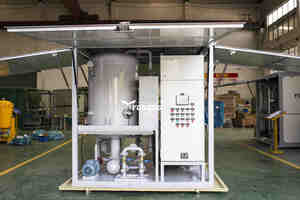The Crucial Role of Transformer Oil Dehydration
Body
Understanding Transformer Oil Dehydration
Transformer oil, also known as insulating oil, plays a pivotal role in cooling and insulating the transformer's core. Over time, however, this oil can absorb moisture, contaminants, and impurities, jeopardizing its insulating properties and the overall efficiency of the transformer. Dehydration, the process of removing moisture from the oil, becomes essential to maintain optimal performance and prevent potential breakdowns.
The Impact of Moisture on Transformer Oil
Moisture is a formidable adversary to transformer oil, capable of causing a cascade of issues within the transformer. Water contamination can lead to reduced dielectric strength, increased oxidation, and the formation of sludge. These factors not only compromise the insulating capabilities of the oil but also contribute to the accelerated aging of the transformer insulation.
Crucial Benefits of Transformer Oil Dehydration
- Enhanced Dielectric Strength: Dehydrating transformer oil significantly enhances its dielectric strength. By removing moisture, the oil can better withstand electrical stress, reducing the risk of partial discharges and breakdowns.
- Prolonged Transformer Life: Effective dehydration contributes to the longevity of transformers. By preventing the corrosive effects of moisture, the insulation system remains intact, extending the operational life of the transformer.
- Improved Cooling Efficiency: Moisture-laden oil is less effective in dissipating heat, leading to reduced cooling efficiency. Dehydration ensures that the oil retains its optimal thermal properties, facilitating efficient heat dissipation.
- Mitigation of Sludge Formation: Dehydration minimizes the formation of sludge and deposits within the transformer. Sludge can clog vital components, impeding oil circulation and hindering the overall performance of the transformer.
Advanced Techniques in Transformer Oil Dehydration
- Vacuum Dehydration: This technique involves subjecting the transformer oil to a vacuum, lowering the boiling point of water, and facilitating its removal. Vacuum dehydration is highly effective in eliminating both free and dissolved water from the oil.
- Centrifugal Separation: Centrifugal separators utilize high-speed rotation to separate water and contaminants from the oil. This method is efficient in removing larger water particles and impurities, ensuring clean and dry transformer oil.
- Desiccant Breathers: Installing desiccant breathers on transformers acts as a preventive measure, absorbing moisture from the air before it can infiltrate the transformer oil. This continuous drying process helps maintain low moisture levels.
Conclusion
In the realm of power grids, the significance of transformer oil dehydration cannot be overstated. Safeguarding transformers against the insidious effects of moisture ensures the reliability and resilience of power distribution networks. By adopting advanced dehydration techniques, power utilities can not only protect their infrastructure but also contribute to a sustainable and uninterrupted supply of electricity. As we navigate the evolving landscape of energy demands, the proactive dehydration of transformer oil emerges as an indispensable practice in securing the backbone of our power systems.












Comments